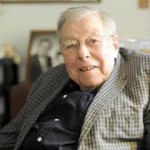|
I am saddened to share the news of the death yesterday, October 29, 2015, of our Distinguished Member Richard A. Ware, just shy of his 96th birthday.
Richard A. Ware
1919-2015
Richard A. Ware was born in New York City, November 7, 1919. He received his B.A. from Lehigh University in 1941 and his Masters in Public Administration from Wayne State University in 1943. Following his graduation from Lehigh, Ware worked as a research assistant with the Detroit Bureau of Government Research, 1941-1942 and personnel technician with the Lend-Lease Administration in Washington, 1942-1943.
After wartime service with the Air Force, Ware worked as research associate to the assistant director of the Citizens Research Council, 1946-1956. During the latter part of these years and for the remainder of his career, Richard Ware served in various capacities with the Earhart and Relm Foundations in Ann Arbor, Michigan, as secretary (1951-1970) and as trustee and president (1970-1984). Thereafter he served as trustee and president emeritus.
During the Nixon Administration, Ware took time off to serve as principal deputy assistant secretary of defense for international security affairs, 1969-1970, then as consultant in the office of the assistant secretary of defense, 1970-1973.
Throughout his career, Ware was active in numerous business, civic, and public policy organizations and groups. He was assistant director of the Michigan Joint Legislative Committee on Reorganization of State Government, 1950-1952 and secretary of the Governor’s Committee to Study Prisons, 1952-1953. Ware was also active in Republican Party activities, particularly during the 1964 presidential campaign of Barry Goldwater when he served as a policy analyst.
Accurate in detail, and the “bio” that Richard approved for use, the foregoing says much, and yet, characteristic of his humility, reveals so very little about the man and his legacy.
Many of you reading this have been, as I was fortunate to be, on the receiving end of an H. B. Earhart Fellowship, an Earhart research grant, a Richard M. Weaver Fellowship from ISI, and/or a Fellowship to attend a Philadelphia Society meeting, all programs that Richard helped to shape and sustain for many decades. Our gratitude for these opportunities and the ways that we continue to work in our various ways to ensure such opportunities for future generations will long be one of Richard Ware’s living legacies.
Those of us lucky enough to get to know Richard personally, as more than a name on a letterhead or a signatory of a grant award, can testify as well to the tremendous gift we received in having known such a wise counselor, encourager, confidant, and intellectual resource. Over the past several years, Richard read and generously commented on much of my writing and patiently answered my questions on everything from Red Miller to the wrong turn of public administration (the academic discipline as well as the practice) to future prospects for philanthropy. Now and again, an email would pop up from Richard with something from the Wall Street Journal or another recent publication that he knew would be relevant to something on my mind, and we would enjoy a brief discussion, and I would always be richer for the exchange.
With Richard, no matter how dark the topic, one always came away with a glimmer of hope. Concluding one missive, in which he was sharing with me his pessimism about the future freedom of philanthropic foundations, he signed off: “‘Tis a bright autumn day in the hills signaling me to desist from my gloomy notions.”
I was twice able to trek out to his home in New Hampshire, nestled cozily in those hills at the foot of Hurricane Mountain Road, which closes in the winter months. My first adventure was to arrive at Richard’s home having come somehow from the “wrong side” of the mountain, having had to drive up up up and down down down, with a light snow powder falling all around… and wondering whether I would find the gates of the road closed if I ever made it to the other side! Another gift of a day, experiencing that beautiful part of our world Richard called home.
What did I learn from Richard? So much and more… but I think it is best summed up in what he said to me when he told me the story of trying to recover some papers of Loren Miller’s after the latter’s untimely death in an automobile accident in the mid-1950s. (Among other things, Miller was the director of the Citizens Research Council in Detroit.) When Richard visited Miller’s widow to request that Miller’s extensive papers be donated to the Burton Historical Collection of the Detroit Public Library, he learned that she had burned everything he wrote. “I have done my best,” he concluded.
And that, Friends, is as worthy an ambition and legacy for which any of us might strive in this world. Take heart, and tonight lift your prayers and your glasses in remembrance and thanks for Richard Ware, who did his best that we might likewise do ours.
I can hear him now, characteristically bidding us “Cheerio!”
Lenore
|

